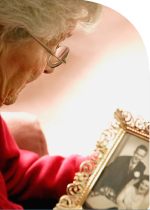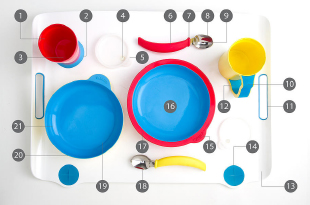
A Personal Note From TiffanyI recently heard that 38% of women over the age of 65 who have long term care insurance will end up letting their long term care insurance lapse. That's crazy, isn't it?? People generally obtain long term care insurance for a purpose - covering for their care when they need it. These policies seem to be lapsing due to cognitive impairment by the insured. So, in other words, the people who will most need long-term care may be the same people who already have or will have memory problems, which means they're more likely to accidentally let a policy expire. What's the solution to all this? Like so many challenges in life, the best answers are probably found in preparation and communication. Be informed, read and talk with your advisors, family and friends. Together, we can help make the "golden years" that much easier. Thanks for taking the time to read and reflect!
Warmly,
|
The Financial Difficulties Faced By Widows |

|
|
Losing one's husband is difficult enough in and of itself. Unfortunately, many widows must also contend with the financial consequences of the loss of their husbands. According to government figures cited in a recent article in the New York Times, the household income for widows typically drops 37 percent after a spouse dies, far more than the 22 percent income decline experienced by men who lose their wives. The assets of widows also tend to fall substantially more than those of widowers. This is compounded by the fact that women typically live longer than men. Census figures indicate that one in four women from 65 to 74 are widows. By the age of 85, three out of four women are widows. To make matters worse, even couples with estate plans often fail to address the need for adequate income that will be faced by a surviving spouse. Talking about income, especially with regard to the aftermath of a spouse's death, is emotionally difficult. Cindy Hounsell founded the nonprofit Women's Institute for a Secure Retirement two decades ago when she discovered just how many women face financial difficulty in their retirement. During her workshops, she meets women who tell her they are too afraid or timid to ask their spouse the question "Am I going to be okay if you die?" Ms. Hounsell also notes that many women are not adequately involved in family finances. To help women prepare for their financial lives in the future, her institute offers checklists for financial readiness, pension plans, savings and investment, and some checklists geared specifically toward widows. "Women need to know where things are -- life insurance policies, safe deposit boxes and keys, investment accounts -- all of it," said Hounsell. "We also tell women they should have their own accounts, an extra stash of money that's not just for emergencies, and their own credit cards." Other asset and income management issues married women need to find out about include when the mortgage on the home will be paid off, whether there is a 401(k) or pension plan for one or both spouses, and if the couple owns investment property or several bank accounts. One of the most complicated issues is often determining how to obtain the maximum payment from Social Security, which is an important source of income for many older women. The New York Times article also points out that studies show people in general are not saving enough to meet their needs in retirement. The federal government has just created a new website, aging.gov, to provide all Americans, not just widows, with a wealth of helpful information about better understanding retirement and other issues relevant to seniors and their loved ones.
|
What To Look For In A Nursing Home |
|

|
|
If you have made the difficult decision that nursing home care is the best option for your loved one, you must decide on the nursing home itself. Here are some of the issues to consider when choosing a nursing home. Location, location, location.This may seem obvious, but one of the most important aspects of an individual's quality of life in a nursing home is receiving frequent visits from members of the family. When the nursing home is nearby, it's easier for you and the rest of your family to visit. Similarly, if the nursing home is located relatively close to where your loved one lived previously, his or her former neighbors and friends will be more likely to visit. Special services.On the most basic level, if your loved has specific physical needs, the nursing home must be able to address them. And what about emotional or spiritual needs? If your loved one is religious, for example, does the facility offer religious services? References.Does the nursing home in question have references? Some facilities will allow you to contact family members of current residents to discuss the level of care provided by the nursing home. This is a good sign, and you should take advantage of the opportunity. What does the research say?You can find a wealth of information about specific nursing homes online. For example, you can purchase detailed nursing home reports by visiting www.carescout.com. Another site, www.medicare.gov, provides a great deal of information about nursing homes, including inspections of certain facilities over the last three years. This site allows you to download a detailed checklist to use while touring a nursing home. How does the facility "feel" during your tour?A well-dressed receptionist or nice chandelier in the lobby does not mean your loved one will receive the best possible care. Nor does a lack of fancy accessories mean he or she will be treated poorly. What matters most is the attitude of the staff, the demeanor of the residents, and the overall feeling you get as you tour the facility. Do the people working at the nursing home seem friendly and are they willing to answer your questions? Do the residents appear relaxed and comfortable? What is on the menu for dinner? Trust your instincts. If something doesn't feel right, no matter how nice the facility appears, look elsewhere. |
A Designer Has Created Tableware To Help People With Dementia |
|

|
|
Alzheimer's and other neurodegenerative diseases can make even basic tasks extraordinarily difficult. Designer Sha Yao saw this firsthand when her grandmother was diagnosed with Alzheimer's disease. In response, she created Eatwell, a seven-piece tableware set. It features bright, primary colors, which Yao chose based on a Boston University study that showed individuals with cognitive impairment consumed 84 percent more liquid and 24 percent more food when they were served in brightly-colored containers. According to an article on the website www.mentalfloss.com, other features of the tableware set include cups and bowls with angled bases. This allows contents to shift naturally to one side and make them easier to drink or scoop up. The accompanying spoons are ergonomically designed to correspond to the contours of the bowls. In addition, the tableware set has holes with flaps at the edge of the tray where a napkin, bib or apron can be tucked to prevent spills. The set's drinkware features wide bases, reducing the likelihood that they will be knocked over. "Raising awareness and addressing the needs of people with impairments will allow them to maintain their dignity, retain as much independence as possible, and reduce the burden on their caretakers," said Yao. "That's what made designing the Eatwell tableware set so rewarding."
|




